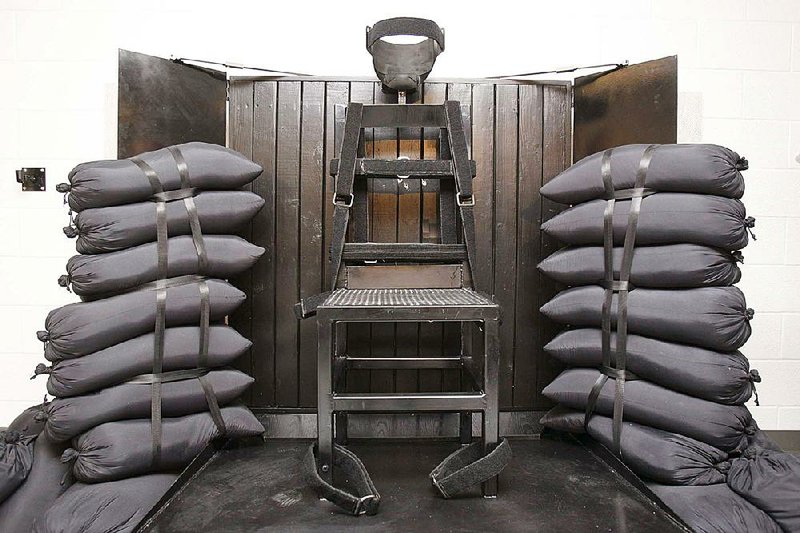SALT LAKE CITY -- Utah lawmakers have passed a bill that would make it the only state to allow firing squads for carrying out a death penalty if there is a shortage of execution drugs.
The bill's passage Tuesday in the state Senate comes as states experience a shortage of lethal injection drugs that has officials struggling to obtain them.
The legislation's sponsor, Republican state Rep. Paul Ray of Clearfield, touted the measure as being a more humane form of execution.
A team of trained marksmen is faster and more humane than the drawn-out deaths that have occurred in some lethal injections where states turned to alternative drugs, Ray said.
The bill gives Utah options, he said. "We would love to get lethal injection worked out so we can continue with that, but if not, now we have a backup plan," Ray said.
Opponents disagreed, saying firing squads are a cruel holdover from the state's Wild West days and will earn the state international condemnation.
"I think Utah took a giant step backward," said Ralph Dellapiana, director of Utahns for Alternatives to the Death Penalty. Firing squads are "a relic of a more barbaric past," he said.
The Legislature should be discussing whether, not how, to execute people, Dellapiana said. He called discussion comparing different execution methods morbid.
Whether it will become law in the conservative Western state is unclear: Utah Gov. Gary Herbert, a Republican, had not said whether he would sign the measure. But his spokesman, Marty Carpenter, issued a statement this week acknowledging that the method would give Utah a legitimate backup method if execution drugs are unavailable.
Utah American Civil Liberties Union representative Anna Brower said the organization was still holding out hope that Herbert would not sign the bill. Brower said the legislation would make Utah "look backwards and backwoods."
The bill would reinstate the use of firing squads more than a decade after the state abandoned the practice.
Brower said she was encouraged by the close vote last month in the House, where it was narrowly approved after additional lawmakers were called in to break a tie vote. She called Tuesday's Senate vote 18-10 in favor of the bill "disappointing."
Utah is one of several states to seek out new forms of capital punishment after a botched Oklahoma lethal injection last year and one in Arizona that took nearly two hours for the condemned man to die.
Legislation to permit firing squads has been introduced in Arkansas this year, and in Wyoming, a similar measure failed. In Oklahoma, lawmakers are considering legislation that would let the state use nitrogen gas to execute inmates.
Utah's proposal keeps lethal injection as the primary method of execution, but it allows for the state to use firing squads if the state cannot obtain lethal-injection drugs.
States across the country have struggled to keep up their drug inventories as European manufacturers have refused to sell the lethal concoctions to prisons and corrections departments because of their opposition to the death penalty.
Texas' supply will be used up if the state goes forward with two lethal injections planned in the next two weeks. The Texas deadline is the most imminent, but other states are struggling, as well.
The head of Utah's prison system has said the state does not have any lethal-injection drugs on hand and would have to obtain some in the years ahead if an execution were to be scheduled.
States turning to alternative drugs have been faced with legal challenges from inmates, something Ray has said Utah could sidestep if it has a backup execution plan in place.
Utah lawmakers stopped offering inmates the choice of a death by firing squad in 2004. A handful of inmates on Utah's death row were sentenced before the law changed and still have the option of going before a firing squad after their court appeals are exhausted, even if Herbert does not sign the new measure into law.
Utah's last execution was by a firing squad in 2010, when Ronnie Lee Gardner was executed by five police officers with .30-caliber Winchester rifles. The state has carried out three executions by firing squad since the U.S. Supreme Court reinstated the death penalty in 1976.
Utah prisoner Gary Gilmore was the first inmate executed in the U.S. after the U.S. Supreme Court lifted the moratorium on the death penalty in 1976. Gilmore was executed by firing squad in early 1977.
The Washington, D.C.-based Death Penalty Information Center, which opposes capital punishment, has said a firing squad is not a foolproof execution method because the inmate could move or shooters could miss the heart, causing a slower, more painful death.
One such case appears to have happened in Utah's territorial days in 1879, when a firing squad missed Wallace Wilkerson's heart and it took him 27 minutes to die, according to newspaper accounts.
A Section on 03/11/2015
